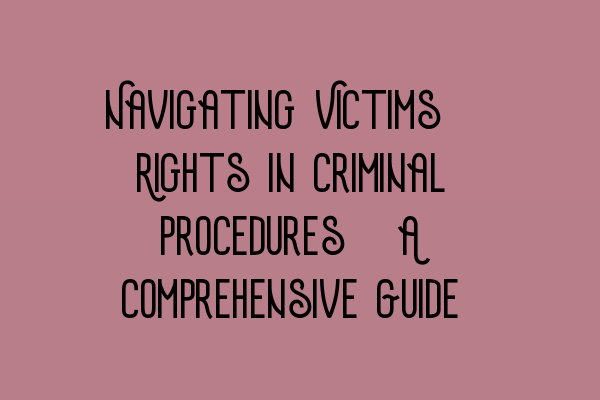Navigating Victims’ Rights in Criminal Procedures: A Comprehensive Guide
Welcome to the comprehensive guide on navigating victims’ rights in criminal procedures. The criminal justice system can often be complex, intimidating, and overwhelming for victims of crime. This guide aims to break down the intricate process and shed light on the various rights and support available to victims. Whether you are a victim of a violent crime, theft, or any form of misconduct, this post will provide valuable insights to help you understand and exercise your rights throughout the criminal proceedings.
Understanding Victims’ Rights
As a victim of a crime, it is crucial to familiarize yourself with your rights in the criminal justice system. Victims’ rights are designed to ensure that you, as the victim, are treated with fairness, respect, and dignity throughout the legal process. These rights are enshrined in legislation and aim to empower you during a challenging and often distressing time.
There are various rights you are entitled to as a victim, including:
- The right to be kept informed:
- The right to participate in proceedings:
- The right to protection and support:
- The right to restitution:
- The right to privacy:
Each of these rights plays a crucial role in ensuring that your voice is heard, your needs are addressed, and justice is served.
Knowing Your Role in Criminal Proceedings
When it comes to criminal proceedings, it is important to understand your role as a victim. While the focus is often on the accused and the legal process, victims have an active role to play throughout the proceedings.
First and foremost, you have the right to be kept informed about the progress of the case. This includes being informed about court dates, major developments, and any changes that may occur during the proceedings. Staying informed helps you stay on top of the case and make informed decisions.
Furthermore, you have the right to participate in proceedings. This can include giving a victim impact statement, attending court hearings, and providing evidence. Your participation allows you to have a say in the outcome and ensures that your perspective is considered.
In addition to participating in the legal process, it is crucial to prioritize your well-being. You have the right to protection and support throughout the proceedings. This can involve receiving legal advice, counseling services, and access to victim support organizations. Taking care of your emotional and physical well-being is essential during this challenging time.
Exercising Your Rights
Now that you understand your rights and role as a victim, it is essential to know how to exercise these rights effectively. To begin with, it is highly recommended to seek legal representation. A solicitor who specializes in criminal law can guide you through the process, ensure your rights are protected, and advocate for your best interests.
Furthermore, staying informed about the case is vital. By following the updates and developments, you can actively engage in the proceedings and make informed decisions. The court clerk or your solicitor will provide you with information about court dates, but it is also essential to stay connected with your legal team.
Additionally, take advantage of the support available to you. Victim support organizations can provide emotional support, practical assistance, and information about your rights and entitlements. Don’t hesitate to reach out to these organizations, as they are dedicated to helping victims navigate the criminal justice system.
Conclusion
Navigating victims’ rights in criminal procedures can be a daunting task, but with the right knowledge and support, it becomes more manageable. This comprehensive guide has provided an overview of victims’ rights, your role in criminal proceedings, and tips for exercising your rights effectively.
Remember, you are not alone in this process. Seek legal representation, stay informed, and utilize the support available to you. By doing so, you can navigate the criminal justice system with confidence and ensure that your rights as a victim are upheld.
For more information and resources related to SQE criminal law and practice in the UK, please visit the following links:
- SQE 1 Practice Exam Questions
- SQE 1 Practice Mocks FLK1 FLK2
- SQE 2 Preparation Courses
- SQE 1 Preparation Courses
- SRA SQE Exam Dates
